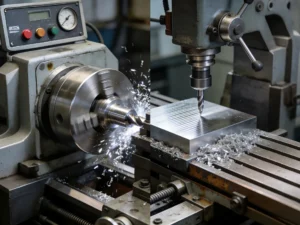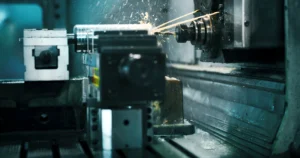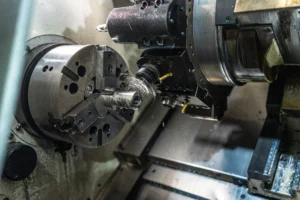Choosing the Right CNC Lathe for Your Needs
Choosing the right CNC lathe is crucial for your business, as it directly affects productivity, cost-effectiveness, and the quality of the final product. A CNC lathe is more than just a machine, it is an investment in your future operations. Let’s take a closer look at how to make this decision:
Key Factors to Look For
1. Precision and Accuracy
Precision is the heart of any CNC lathe. Without it, you risk defects, materials wasted and downtime. When evaluating a CNC lathe, consider the tolerance levels–machines with finer tolerances allow for intricate designs and high-quality output. For example, if your company manufactures aerospace parts, you’ll need a lathe capable of working to micron-level precision. Search a machine that guarantees consistent, repeatable accuracy.
2. Size and Capacity
The size of your lathe is more important than you might think. A small lathe is fine for machining smaller parts, but it can quickly become a bottleneck for larger projects. On the other hand, a large lathe can machine larger workpieces, but the space requirements are greater and the cost is higher. Choose based on the type of materials you machine most often. For example, a small lathe might be fine for machining parts like automotive valves, while large one like industrial pumps might require a larger capacity machine.
3. Control System and Software Compatibility
In today’s world, a CNC lathe is only as good as its software. The control system must integrate seamlessly with your design software (CAD/CAM), ensuring that the machine performs exactly as instructed. If your team uses Auto CAD or Fusion 360, make sure the lathe is compatible with those platforms. Meanwhile machines with modern, user-friendly interfaces and cloud capabilities can also speed up operations and improve accuracy. As a real-world example, businesses that work with multi-axis machining often find machines like the Haas ST series incredibly reliable for their software flexibility.
4. Material Compatibility
Not all lathes can handle every material, so consider the types of materials you process regularly. Are you processing metal, plastic or composite materials? Some machines are specifically designed for heavy-duty metals like stainless steel, while others are optimized for softer materials. Such as a machine suited for turning titanium components in the aerospace industry will likely be more expensive but necessary for precision-heavy work. Assess the material needs of your business first to avoid costly upgrades later.
Factors Affecting CNC Lathe Pricing
CNC lathe prices vary widely, so it is important to understand the factors that affect price so you can make an informed purchasing decision.
- Service life and Status: New CNC lathes are expensive, but they are usually equipped with the latest technology and have higher reliability. On the other hand, buying a used machine could save a significant amount of money. However, a thorough examination of the condition of second-hand machine tools is essential. Ensure they’re free of defects and have a good service history. If possible, try to choose a recently refurbished machine.
- Brand and Reputation: Well-known brands like Haas, Mazak, and Siemens are reliability and long-term support, but the price is also higher. If you’re on a tight budget, consider at less expensive brands with solid customer reviews, but sure to weigh the risk of limited customer service or parts availability. A typical example is the Doosan Puma series, known for offering stable performance at a lower price point than its competitors.
- Additional Features: It’s like that multi-axis capability, automatic tool changers, and integrated robotic arms can increase the cost of a CNC lathe. While these features can improve efficiency and capabilities, they may not be necessary for simpler projects. Before choosing a high-end machine with advanced features, carefully evaluate your needs.
Where to Buy CNC Lathes
1. Online Marketplaces:
Online marketplaces like eBay or Alibaba are great for finding both new and used CNC lathes. These platforms give you the freedom to compare multiple sellers and machines. However, buying online requires caution. Always check seller ratings, request photos, and, when possible, ask for a demo or virtual tour to ensure you’re getting what’s promised. Additionally, online vendors might offer warranty or service packages, so verify these before proceeding with the purchase.
2. Direct from Manufacturers:
Purchasing directly from a manufacturer like Haas or Mazak guarantees that you’re getting the latest model with full manufacturer support. Though it may cost more upfront, buying direct often includes a warranty and customer support for troubleshooting, which can be worth the investment in the long run. Manufacturers also offer customization options to meet your unique needs, such as special attachments or software upgrades.
3. Local Dealers and Resellers:
Local dealers provide a more hands-on approach. They might allow you to see the machine in action, test it before purchase, and offer better post-sale support. Many dealers also have partnerships with manufacturers, ensuring that you’re buying from a trusted source. Additionally, working with a local dealer might result in more favorable delivery terms and faster service should any issues arise.
Considerations When Buying Used CNC Lathes
- Wear and Tear: Before committing to a used lathe, check for signs of wear. For example, inspect the spindle, motor, and tool changers. If the machine has been used extensively, certain parts might need replacing, which could add to the overall cost. Always ask for a full service record, and if possible, have the machine inspected by a qualified technician before purchasing.
- Software Compatibility: The software is just as important as the hardware. Outdated or incompatible software can make it difficult to integrate the lathe into your existing workflow. Ensure that the machine uses software compatible with your current systems. Some older machines may require upgrades to run modern programs, which can be costly.
- Parts Availability: When purchasing used equipment, one critical concern is the availability of spare parts. Some manufacturers may stop producing parts for older models, which can make repairs more difficult and expensive. It’s important to verify that parts for the specific model are still available before making your purchase.
Maintaining Your CNC Lathe
Proper maintenance is key to maximizing the lifespan and performance of your CNC lathe. Regular care can help avoid costly repairs and downtime.
Maintenance and Upkeep Tips
1. Regular Cleaning and Lubrication
Keeping your lathe clean and lubricated is essential. Regular cleaning prevents the buildup of debris that could affect performance, while lubrication reduces friction and extends the life of the machine’s moving parts. Use the manufacturer’s recommended lubricants and cleaning materials for the best results.
2. Software Updates and Backups
Regularly update the machine’s software to keep it running smoothly. New software versions can introduce bug fixes, new features, and better security. Additionally, back up your programs and configurations to avoid losing important data due to system malfunctions.
3. Preventive Maintenance
Schedule routine inspections to check for wear, especially on critical components like the motor, spindle, and tool holders. Periodic preventive maintenance can detect problems early, allowing you to address issues before they escalate into more significant and costly repairs.
Conclusion
Choosing the right CNC lathe is a critical step for any business looking to improve its machining processes. Whether you go for a new or used machine, the key is to evaluate your needs carefully and make a choice that supports your long-term goals. Keep in mind that maintenance, software updates, and compatibility with your current systems are just as important as the machine’s specifications. By following the tips and guidelines in this article, you’ll be better equipped to make a sound decision that enhances your operations.




